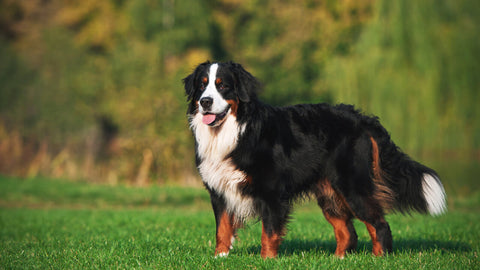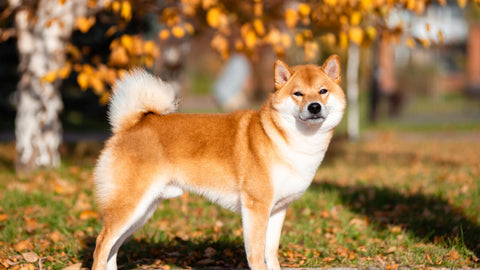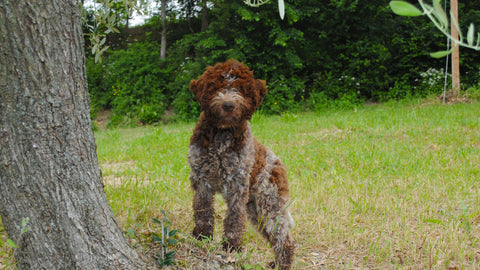Contents
- Introduction to the Bernese Mountain Dog
- Appearance of the Bernese Mountain Dog
- Coat and colours of the Bernese Mountain Dog
- How big can a Bernese Mountain Dog get
- The character of the Bernese Mountain Dog
- Training the Bernese Mountain Dog
- Who is the Bernese Mountain Dog suitable for
- Is the Bernese Mountain Dog a family dog
- Care of the Bernese Mountain Dog
- Nutrition of the Bernese Mountain Dog
- How much does a Bernese Mountain Dog shed
- How old does a Bernese Mountain Dog get
- Typical diseases of the Bernese Mountain Dog
- How much does a Bernese Mountain Dog puppy cost
- What to look for when buying a Bernese Mountain Dog
- Description of the Bernese Mountain Dog
Introduction to the Bernese Mountain Dog
The Bernese Mountain Dog is one of the four Swiss Mountain Dog breeds and is very popular worldwide. It was originally bred as a versatile farm dog in the Swiss Alps, where it served as a herding and draft dog. Today, the Bernese Mountain Dog is best known as a family dog and loyal companion. Its friendly nature, good nature and impressive appearance have earned it a firm place in the hearts of many dog lovers. Its calm and even-tempered nature makes it an ideal companion, especially for people who have plenty of space and time to meet the needs of this large dog breed.
Appearance of the Bernese Mountain Dog
The Bernese Mountain Dog is a large, strong and muscular dog with a strong, harmoniously built body. Its striking, thick fur and proud appearance make it unmistakable. Its head is strong with a broad skull, a well-defined frontal furrow and medium-sized, triangular ears that hang on the sides of its head. Its eyes are dark brown and express an alert but friendly expression. The rib cage is deep and broad, and its limbs are strong and muscular, giving the Bernese Mountain Dog excellent stamina and agility.
Coat and colours of the Bernese Mountain Dog
The Bernese Mountain Dog's coat is one of its most distinctive features. It is long, dense and slightly wavy or smooth, giving it a weatherproof quality, ideal for the outdoor life for which it was originally bred. The Bernese Mountain Dog is known for its characteristic tri-colouring: black, white and reddish brown. The coat is predominantly black, with white markings on the chest, forehead and muzzle, as well as reddish-brown markings above the eyes, on the cheeks and on the legs. This colour combination gives the dog its striking appearance and makes it particularly eye-catching.
How big can a Bernese Mountain Dog get?
Bernese Mountain Dogs are one of the larger dog breeds. Males reach a shoulder height of 64 to 70 cm, while females are slightly smaller and reach a height of 58 to 66 cm. The weight of a fully grown male ranges from 40 to 55 kilograms, while females weigh between 35 and 45 kilograms. Size and weight can vary depending on individual factors, but in general, the Bernese Mountain Dog is considered a large breed.
The character of the Bernese Mountain Dog
Bernese Mountain Dogs are known for their friendly, good-natured and gentle disposition. They are extremely loyal and faithful companions that form a strong bond with their families. Despite their size, they are very sensitive and respond well to positive reinforcement. They are even-tempered and patient, but also alert, which makes them good watchdogs. However, they are not usually aggressive, but tend to approach strangers with curiosity and friendliness. Their calm nature makes them ideal for families, while their intelligence and willingness to learn make them excellent working dogs.
Training Bernese Mountain Dogs
Training a Bernese Mountain Dog requires patience, consistency and a loving but firm approach. Due to their gentle and sensitive nature, they do not respond well to harsh or strict punishments. Positive reinforcement, praise and rewards are the key to a successful education. Since the Bernese Mountain Dog is a clever breed that loves to learn, it should be socialised from an early age and accustomed to different situations, people and other animals. Obedience training courses are also recommended at an early stage to ensure that the dog learns how to behave in different environments.
Who is the Bernese Mountain Dog suitable for?
The Bernese Mountain Dog is perfect for people who have plenty of space and time for a large dog. It is well suited to active families or individuals who are willing to invest time in exercise, training and grooming. Since the Bernese Mountain Dog is very people-oriented, it should not be left alone for long periods of time. A house with a garden is ideal for it, as it likes to be outside but also needs close contact with its family. If you are looking for a calm, gentle and loyal companion, the Bernese Mountain Dog is the ideal partner.
Is the Bernese Mountain Dog a family dog?
Yes, the Bernese Mountain Dog is an excellent family dog. Its gentle and patient nature makes it particularly suitable for households with children. It is friendly, playful and protective of its family, but does not show excessive aggressiveness. Nevertheless, children should learn to treat it with respect, as its size can make it appear unintentionally rough. Its calm nature and ability to adapt to different family situations make it one of the most popular family dogs.
Grooming the Bernese Mountain Dog
Grooming a Bernese Mountain Dog requires a fair amount of time, especially because of its long and dense fur. Regular brushing, preferably once or twice a week, is necessary to prevent tangles and to keep the fur clean and shiny. During the times of the fur change, in spring and autumn, daily brushing may be necessary to remove the loose hairs. In addition to grooming, their ears should also be checked and cleaned regularly to avoid infections. Their claws should also be trimmed as needed to prevent overgrowth.
Nutrition of the Bernese Mountain Dog
A balanced diet is crucial for the Bernese Mountain Dog to maintain good health and quality of life. High-quality dog food that is rich in protein, vitamins and minerals is essential. Due to their size, Bernese Mountain Dogs tend to have joint problems, which is why supplements containing omega-3 fatty acids and glucosamine are often recommended. It is important to adjust the amount of food according to the dog's age, activity level and weight to avoid obesity, as this can lead to health problems.
How much does a Bernese Mountain Dog shed?
The Bernese Mountain Dog sheds all year round, with particularly heavy hair loss during the coat change in spring and autumn. Regular brushing helps to remove the loose hairs and control the shedding. If you decide to get a Bernese Mountain Dog, you should be prepared to regularly vacuum and clean the dog hair off your furniture.
How old does a Bernese Mountain Dog get?
Unfortunately, the life expectancy of a Bernese Mountain Dog is rather short compared to other dog breeds. On average, they live for about 7 to 9 years. However, there are also specimens that can live up to 11 or 12 years, especially if they are well cared for, well fed and receive regular veterinary check-ups.
Typical diseases of Bernese Mountain Dogs
The Bernese Mountain Dog is prone to some health problems, especially due to its size and genetic predisposition. The most common diseases include hip and elbow dysplasia, which can lead to joint problems and movement disorders. In addition, the breed is prone to cancer, especially malignant histiocytomas, which are more common in Bernese Mountain Dogs than in other breeds. Heart problems and gastric torsion are also possible health risks.
How much does a Bernese Mountain Dog puppy cost?
The cost of a Bernese Mountain Dog puppy varies depending on the breeder, region and parentage. As a rule, the price for a puppy is between CHF 1500.00 and CHF 2500.00. Reputable breeders invest a lot in the health and well-being of the parent animals and puppies, which is reflected in the price. It is advisable to pay attention to the quality and seriousness of the breeder when purchasing and not to buy puppies from questionable sources.
What to look out for when buying a Bernese Mountain Dog?
When buying a Bernese Mountain Dog, you should make sure that the breeder is reputable and responsible. The puppy should come from a controlled breeding programme with healthy parents. Make sure that the breeders can provide health certificates, especially with regard to hip and elbow dysplasia as well as genetic diseases. The puppy should grow up in a clean environment and be well socialised. It is advisable to visit the puppy in person and get an idea of the conditions in which it is kept.
Description of the Bernese Mountain Dog
Origin: Switzerland
Height: males 64–70 cm, females 58–66 cm
Weight: 40–55 kg, bitches 35–45 kg
Life expectancy: 7–9 years
Coat: Long, dense, slightly wavy or smooth
Colours: Tricolour – black, white , reddish-brown
Character: Friendly, good-natured, loyal, even-tempered
Grooming requirements: High (regular brushing required)
Special features: Prone to joint problems and cancer




Comments (0)
There are no comments for this article. Be the first one to leave a message!